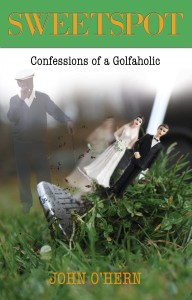Author interview: John O’Hern, Sweetspot, Confessions of a Golfaholic
 4/20/14 INTERVIEW WITH JOHN O’HERN, COMEDIAN, PLAYWRIGHT, AND AUTHOR OF THE LAUGH-OUT-LOUD FUNNY NOVEL SWEETSPOT, CONFESSIONS OF A GOLFAHOLIC
4/20/14 INTERVIEW WITH JOHN O’HERN, COMEDIAN, PLAYWRIGHT, AND AUTHOR OF THE LAUGH-OUT-LOUD FUNNY NOVEL SWEETSPOT, CONFESSIONS OF A GOLFAHOLIC
The International Network of Golf named Sweetspot its 2013 Outstanding Achiever, and the New England Golf Monthly said, “If you’re crazy about golf or you’re a golf widow, then you have to put the book Sweetspot, Confessions of a Golfaholic by John O’Hern on your must-read list.” Or if you just plain like to laugh, I say. The Golf Monthly continues, “Illuminating what happens in any addiction, this compelling story takes the reader on a rollicking ride through the stages of main character Tom’s obsession with golf and how it pushes his life and marriage out of bounds.” Personally, I don’t think you need to be crazy about golf: substitute any obsession you want, as long as you can keep your sense of humor about it.
The author brings to his characters in Sweetspot the insight and imagination that made the one-man play Rooster in the Hen House “a showcase for the appealing versatility of Mr. O’Hern, who plays, among other characters, a little girl, his wife, an eccentric Irish barfly full of sex advice, a birthing coach, women in labor, a cool obstetrician, an Indian anesthesiologist, a Jamaican nurse, squeamish fathers-to-be and an infant in the process of being born” (10/1/03 New York Times Theater Review, “A Blessed Event and Everything Leading Up to It”). Good grief, no problem getting into the minds of characters for this author.
Q: Your one-man play, Rooster in the Hen House, was about a stay-at-home dad, something you did. What was life as a full-time parent like?
A:It was everything you might imagine it to be. It was pretty dull in the beginning. Looking after a three-month-old day in and day out is not all that exciting. Babies tend to nap a lot. On the other hand that was when I started writing. As my son got older I went through some interesting changes. Starting out as a totally self-oriented actor type, I began to notice how beautiful a creation he was. I remember looking in his crib one day, him kicking and laughing at me, so excited that I had come to get him, and the beam of love coming out of his eyes was extraordinary. I felt like I was looking into the eyes of God. As the years passed I became aware that we were both learning from each other. Mostly he taught me. For example, one morning when Max was around five years old, I was having a cup of coffee in the den when I heard a plate smash in the kitchen. As was my way at the time I shouted out, “What the hell was that?” There was a moment’s silence and then he cried out, “You’re supposed to ask me if I’m okay.” Because of all the time I spent with my two kids, I have a thousand memories just like that. I wouldn’t trade it for anything.
 Q: Sweetspot is about marriage as much as about golf. You are a golfer, a comedian, an actor, and a writer, all obsessional callings. I’m sure my other half would say I’m the perfect spouse (right, if I held a gun to his head). Is your wife always happy with you?
Q: Sweetspot is about marriage as much as about golf. You are a golfer, a comedian, an actor, and a writer, all obsessional callings. I’m sure my other half would say I’m the perfect spouse (right, if I held a gun to his head). Is your wife always happy with you?
A: Eh…..no. I’ve been married for twenty-eight years and many, many times we’ve had to make sure there wasn’t any sharp cutlery nearby when we were arguing. I can’t speak for the rest of humankind but on top of all the other roles you list for me, I’m also an idiot. I can be selfish, cruel, lazy, and painfully stubborn, none of which make for a happy spouse. If I weren’t occasionally funny she would have kicked me out long ago. She, on the other hand is a saint.
Q: What’s among the best jokes you’ve ever heard?
A: Off the top of my head? It’s a quote from Bob Dole. Newt Gingrich came to Dole and asked him why people took such an instant dislike to him. Without hesitation Dole looked up and replied, “Cause it saves time.” Ha, ha, ha!
Q: Mark Twain probably is the foremost humorist of American letters. I remember Jane Smiley’s novel Moo making me laugh, and I know that Richard Russo’s Straight Man is among my all-time favorite books in part because it’s so funny. Can you recommend a few novels for their humor?
A: T.C. Boyles Water Music is hysterical, as is Kennedy’s Confederacy of Dunces, both books my wife (the saint) gave me. Almost any of the dialogue between spies in a John le Carré novel is wonderful. Full of bite and irony. There’s a beer concoction they serve in Bermuda called a Dark and Stormy. That’s how I like my comedy.
Q: Some humor lies in contrast. In a W.C. Fields movie (possibly The Bank Dick; I forget) Fields and a bartender talk about a woman once coming into the bar, apparently unheard of at the time. Fields claims he knocked her down, but the bartender says, “You didn’t knock her down, I did,” to which Fields retorts, “Ah, yes, but I was the one who started kicking her.” In this case, a gap between how we expect ostensibly decent people to behave and how they actually behave—and, further, what they think admirable behavior—is funny. But I’ve never analyzed humor. Are there several constructs or devices of humor? Irony is another, right?
A: First of all I can’t believe you use W.C. Fields as your example. I am a huge, huge fan of his. That scene with the midget bartender is among my favorites. Someone came up to him on the set of My Little Chickadee one day and said, “Boy, that Mae West, she’s a real looker, don’t you think?” Fields replied, “She’s a plumber’s idea of beauty.” I read that story when I was fourteen and even then I savored the bite in that remark. Unfortunately, Miss West was standing right behind him when he said it and they never worked together again.
I’ve never studied comedy on an academic level either but, yes, I suppose there are varied forms. I’m a big fan of sarcasm myself. “Honey…do you think I look fat in this dress…” Fill in the blank and you’re off to the races. Comedy is usually generated on several levels. It comes from character: if for instance you’re talking about someone who is an addict, (think Trainspotting) his behavior can be just awful….but very funny. It comes from the situations that we writers put our characters in. A man lying in bed recovering from a heart attack isn’t funny….until you put a non-stop talker with terrible gas in the bed next to him. Like any good comedian, I like to say and write what most polite people are only thinking. That’s what made Fields so clever, he said what we thought. That’s what makes House of Cards so watchable. Kevin Spacey’s character tells us what he’s thinking. It’s delicious.
Q: In my interview here two months ago with Garry Craig Powell, author of Stoning the Devil, he said, “For the first time in history in a developed society, women have control over their reproductive rights, and if not full economic equality, at least the means to financial independence, so in theory they are not subject to control by men. But as yet, we have not come to a modus vivendi. The rules of engagement are still being negotiated. It’s very difficult for women, who often struggle to be both perfect traditional role models, wives and mothers, and at the same time liberated modern ones, career women who are sexually free. But it’s also hard for men. In the past a man knew where he stood and how he was supposed to behave. Nowadays men are confused. On the one hand they’re told that women want them to be sensitive, to help with the housework, child-rearing and so on; on the other, the images of men promoted in the media are still of muscle-bound action heroes. A glance at Hollywood’s favorite actors shows this. So most people are doing a kind of dance between traditional roles and so-called liberated ones, and it’s exhausting and perplexing.”
Both Rooster in the Hen House and Sweetspot deal with sex roles and marriage. Would you care to shed your light on Powell’s remark?
A: I agree that it can be confusing for men, but exhausting? It’s just change, and change can be difficult. As time goes by I think that we are all of us, men and women, slowly….let me repeat that….slowly…beginning to learn that societal role models are red herrings that often lead us down paths that are not fruitful. We are beginning to realize that we have to follow that voice inside us that tells us what path will offer the most fulfillment, and not do what others might find more acceptable.
What’s really interesting to me is that it was the civil rights and women’s lib movements that got the ball rolling on all of this. Once we were forced to awaken to the fact that women might have feelings, needs, and those feelings and needs were legitimate, all kinds of things started coming into focus that weren’t there before. Self-introspection, eastern religions, questioning authority, gay rights, gay marriage, children’s rights, the list goes on and on. To put it more succinctly, not using your penis as a yardstick (there’s joke in there somewhere) to measure your value in society is a good thing. When we embrace our better selves we take sex and color out of our judgment of people’s value. Confusing? Sometimes. Exhausting? I don’t think so.
Gary Garth McCann
First-prize winner for short works and for suspense/mystery, Maryland Writers’ Association, Gary Garth McCann is the author of the novella Young and in Love? and of the novels The Shape of the Earth and The Man Who Asked To Be Killed, praised at the Washington Independent Review of Books. His most recent published stories are available online in Chelsea Station Magazine, Erotic Review Magazine, and in Mobius: The Journal of Social Change. His other stories appear in The Q Review, reprinted in Off the Rocks, in Best Gay Love Stories 2005, and in the Harrington Gay Men’s Fiction Quarterly. See his blogs at garygarthmccann.com and streamlinermemories.com.
- Web |
- More Posts(57)